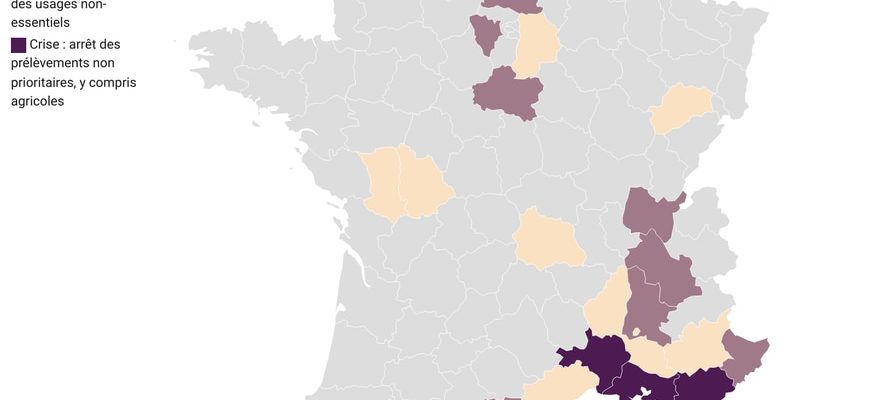Drought is gaining ground in France. Municipalities are on alert in 20 departments, compared to eight last year, according to the latest government figures. The level of “crisis” has even reached in three of them: Bouches-du-Rhône, Gard and Var. The Pyrénées-Orientales will also switch to “crisis” from May 10.
More and more departments have restricted access to water
© / The Express
The “crisis” is the highest level of drought severity in France. When decreed by the prefecture, water restrictions apply in the territories concerned. Thus, “all non-priority samples, including agricultural samples” are prohibited, details the website of the Ministry of Ecological Transition. “Only withdrawals to ensure the exercise of priority uses, such as health, civil security or drinking water are authorized”. No department had reached the crisis threshold at the same time last year.
9 departments on heightened alert
Without being in crisis, nine departments have territories on “enhanced alert”: Ain, Alpes-Maritimes, Aude, Drôme, Isère, Loiret, Oise, Pyrénées-Orientales and Yvelines. . Again, water restrictions are imposed: individuals can no longer fill their swimming pool or wash their car, watering green spaces is prohibited, as is watering vegetable gardens between 9 a.m. and 8 p.m. Last year, only three departments were placed on heightened alert.
Finally, 8 departments are at the “alert” stage, compared to five last year. These are Alpes-de-Haute-Provence, Ardèche, Deux-Sèvres, Haute-Saône, Hérault, Seine-et-Marne, Vienne and Vaucluse. The same water restrictions applied are almost the same as in heightened alert, but on shorter time slots. In Puy-de-Dôme, the prefecture has regulated the use of water in around forty municipalities, without declaring the alert.
The Geological and Mining Research Bureau (BRGM) warned in mid-April of the “proven” risk of summer drought for certain regions. According to him, the March rains were not enough to recharge the French groundwater, 75% of which remains at moderately low or very low levels. “To anticipate the summer of 2023, the prefects must not have their hands trembling when restriction decisions are necessary”, estimated Christophe Béchu, Minister for the Ecological Transition, in a statement sent to AFP.
